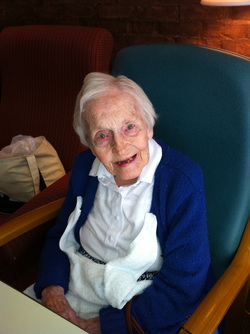
Each time I visit, Mom is less present to this world. She is calm and peaceful and I think, “What a blessing.”
| A Prayer Diary |
|
 I visited my mom today. She was asleep when I walked into the TV room where she often waits until someone leads her to the next activity. She awoke with a touch and gave me her little surprised look of recognition. Being with her is easy as long as I don’t expect much in the way of conversation or response. I looked through the bag on her walker and threw away five or six used paper napkins that she had stashed away, and showed her some of the birthday cards she had received two months ago. Her eyesight is excellent, so I pointed to the words and names and she nodded in some kind of recognition. Each time I visit, Mom is less present to this world. She is calm and peaceful and I think, “What a blessing.”
0 Comments
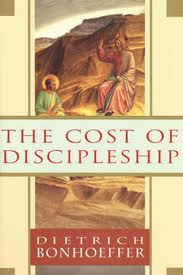 I have finished the biography of Bonhoeffer * and have located my copy of his The Cost of Discipleship, which I have begun reading very slowly, like a meditation. I can’t get Bohoeffer’s phrase “cheap grace” out of my mind. What a apt phase—wham, right in-my-face. No way should I take God’s grace for granted and just go along my merry way. Once I admit God’s grace in my life, responsibility follows. How can I possibly think that God cares whether we have a sunny day for the July 4th parade and picnic? Bohoeffer spent a great deal of time thinking and praying. That’s what I’m doing about all of this. * Bonhoeffer: Pastor, Martyr, Prophet, Spy,” by Eric Metaxas  Tree planted in celebration of Mom's 100 birthday. My visit to my mom yesterday was more than I could have asked or imagined. A truly prayerful time. I woke up after a good night’s sleep to a beautiful morning and nothing on my calendar. A half hour later I was on the road. The trip takes a little over two and a half hours, but I could drive the route in my sleep, and I have book on tape and my blue tooth. I’m set. Mom’s world is very small these days, but she is still knows who I am and thanks me several times for coming. She can’t hear unless I shout right in her ear and her 101 year old brain doesn’t make many connections or remember much from the past, so very few words pass between us. But she smiles, says thank you and holds my hand. I am not advocating that people live as long as my mom, at least not as a goal. But, for those living into those later years, when they can’t make many decisions or take care of all their personal needs, my mom offers a breathtaking example of how to sit in the peace. More than that, she provides all of us with a simple way to be with these very old people. As I was leaving, just when I thought I had Mom all figured out, she asked, “Do you have your keys?” A truly prayerful comment. Clearly I make the visit for her and for me. Giving and receiving doesn’t get any better than this. 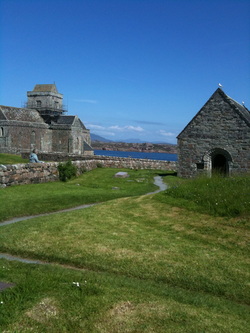 Iona Much has been written about the hardships of pilgrimages and I confess that I want no part of them. Maybe it’s an age thing; maybe a life of privilege; my disposition; my upbringing; the times? Who knows? Perhaps I should feel guilty, pick up my sandals and tunic and set my eyes toward Jerusalem, Santiago de Compostela or Canterbury. Well, I’m not about to head out; I’m not interested. I travel sensibly and safely but not extravagantly. Both the journey and the destination hold value for me, but my overarching purpose is to craft some extended time alone--whether I am on a solitary trip or at the cottage by the sea. I love the beauty of the ocean, the wonder the Scottish moors, or the mystery of a Tuscan hill town. I always have a personally satisfying and enjoyable time, and truth be told, that’s a good reason for me to go. But for a Christian, there is more going on here. I get off alone to seek God, longing to feel once again in that Holy embrace, which is where my call to pray for people starts and ends. Of the many roles that Jesus shows us, I most identify with the Jesus who, in the midst of teaching and healing, went off by himself to pray. My “pilgrimages” give me time and space to empty my mind of all the judgments that obstruct my prayer, because I know that intercessory prayer is about getting out of God’s way so God’s will can be done. 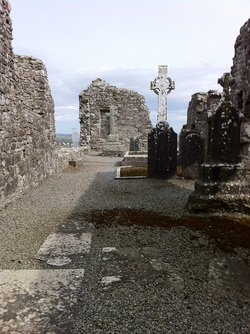 I’ve always been fascinated with the idea of pilgrimage and of course have created my own form, which I must admit has never put me in any kind of hardship. I am particularly thinking about my solitary travel and my cottage by the sea. I’m sure that we all have special criterion for pilgrimage. For me, it’s solitude. I need to go it alone. Even the pilgrimage I took to sacred sites in Ireland felt most authentic when I was off by myself. I didn’t mind meeting others along the way, but I liked starting out not knowing anyone, and always being able to get off by myself. In “The Sacred Journey,” Charles Foster suggests that the Judeo-Christian way is the way of the pilgrim. Take any story in the Old Testament and you find wanderers: Adam and Eve depart from the garden; Abram journeys from Ur to Canaan; Joseph and his brothers traveled to Egypt. We can’t forget Moses and the Israelites wandering about for forty years; even the Arc of the Covenant journeyed for years. Whenever the people settled down for a while, things got tense and so people moved on. Poor Lot’s wife wanted to stay, and look what happened to her. She got stuck. As a pilgrim, Jesus was a paragon. He called his disciples to follow him; he called them away from their settled lives to wander from town to town to spread the news that the kingdom of God was at hand. It seems that he didn’t want them to get too settle because he told them to take very little with them and not to overstay their welcome. Much of this appeals to me these days as I try to get rid of all my chattels and live simply. But what about my solitude? Jesus sends people out two by two. Most picture show pilgrims in a group, not a solitary one. At the moment I have many questions, but few answers. Isn’t that the way ? 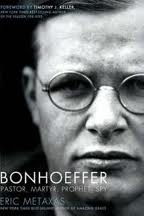 I highly recommend the book I’m currently reading: “Bonhoeffer: Pastor, Martyr, Prophet, Spy,” by Eric Metaxas. The 182 out of 542 pages that I’ve read so far have been inspiring on all accounts—theologically, socially, historically and politically. One of Bonhoeffer themes is to define “church”. For as long as I can remember, church has always been Jesus’ church, “the body of Christ,” never a national or denominational church. But back in the 1930’s the idea of “The Church of Jesus Christ,” was one that was being worked out, particularly by Bonhoeffer. The Nazis had just come to power and were using the church to their ideological advantage. Bonhoeffer, citing Scripture, spoke of the church as universal, not as national, nor as German. “There is neither Jew nor Greek, slave nor free, male nor female, for you are all one in Christ Jesus” Gal. 3.28. Today we are still grappling with this; people and institutions are still using the church for political advantage. Two days in a row now, the Boston Globe has brought to our attention how, in the name of Jesus, the organized church is still trying to exclude people. Following Bonhoeffer prophetic message, Rev. John Unni, priest of St. Cecilia’s Church in Boston, is welcoming all of God’s children to God’s table; all, including gays and lesbians. Recently, while receiving hate mail, Father Unni thought about Jesus’ message to turn the other cheek. “I started praying for these people. But it happened to me. The energy in me changed. Even if you disagree with someone, why would you be hateful?” Again, I am reminded how very central prayer is to the Christian faith. We need to continue to pray, “not my will but thy  I want to add to my 6/9/11 blog and tell you a little more about Louie Zamparini’s experience of redemption. When Louis heard Billy Graham he remembered his promise while on the raft in the Pacific. Here are Laura Hillenbrand’s words in “Unbroken.” “He felt words whisper from his swollen lips. It was a promise thrown at heaven, a promise he had not kept, a promise he had allowed himself to forget until just his instant: If you will save me, I will serve you forever.” After emptying his liquor bottles into the sink, Louie went to a special spot of his in Barnsdall Park and read the Bible that had been sent to his mother by the air corps when they thought he was dead. “Resting in the shade and stillness, Louie felt profound peace. When he thought of his history, what resonated with him now was not all that he had suffered but the divine love that he believed had intervened to save him….In a single, silent moment, his rage, his fear, his humiliation and helplessness, had fallen away. That he morning, he believed, he was a new creation.” 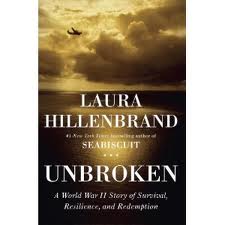 Louie Zamparini, 1934 Olympic runner, survived thirty days on a raft in the Pacific, developed incredible resilience in POW camps in Japan before finding redemption some years later back in the U.S.. His story is told in "Unbroken: A World War II Story of Survival, Resilience and Redemption," by Laura Hillenbrand, a book that I’m recommending to absolutely everyone I know. After the war, it seemed that Louis’ preferred mode of survival was alcohol. In spite of a loving family, wife, and child, many friends, and an adoring public, his life was a mess. Then one day out of desperation, his wife dragged him to hear Billy Graham, and it seemed that Graham was speaking to him. “Here tonight, there’s a drowning man, a drowning woman, a drowning man, a drowning boy, a drowning girl that is out lost in the sea of life. According to Hillenbrand, Louie felt spooked and angry, but nevertheless returned the next night, only to try to sneak out. But on his way he heard Graham say, “This is it, God has spoken to you. You come out.” Louie tore home emptied all the liquor bottles in the house into the sink and threw away all his cigarettes. The next morning Louie felt cleansed; his war demons never returned and he spend much of the rest of his life as a Christian speaker telling. his story.  Here’s another version of praying for the weather. A friend of mine is desperate to sell her house and finally there seems to be an interested buyer about to make a decision today. My friend has asked that I send “positive thoughts,” which is her way of asking for prayers. That sounds like something I can do because it implies that whatever the final decision, it will be made for the good., On the other hand, praying specifically that the person buys the house feels more about “my will be done” than about “Thy will be done.” My imagination can go wild,; in the long run the deal doesn’t work out and my friend is back at square one or worse . I’m thinking that my prayers must include “Thy will be done,” not as an add-on, but in some sincere and heartfelt way. “Thy will be done” makes a prayer a prayer, not just a positive thought. 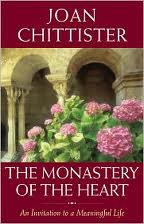 I am just completing a four week E-course entitled “Creating a Monastery of the Heart with Joan Chittister,” sponsored by www.spiritualityandpactice.com. I recommend the site as a rich resource for anyone seeking to deepen their spiritual life, whatever their faith tradition might be. The term Monastery of the Heart is taking on a life of it’s own these days. Sr. Joan’s book, “The Monastery of the Heart”, was published this year. About the same time as the E-course began, the first ever on-line monastery was introduced as an outreach of the Benedictine Sisters of Lake Erie, of which Sr. Joan is member. I heartily recommend this site as well: www.monasteriesoftheheart.org --“a new movement for a new world.” I am in awe of how these women have become leaders in helping all of us, women and men, create a monastery in our hearts and follow a God-filled and God-led life, wherever we are and whatever we do. And here I am, at my cottage by the sea or in my angel room at home, participating in an Benedictine way of life in new ways, know or to be made known to me. Join me. |
Contact me
[email protected] Archives
August 2023
Categories
All
|